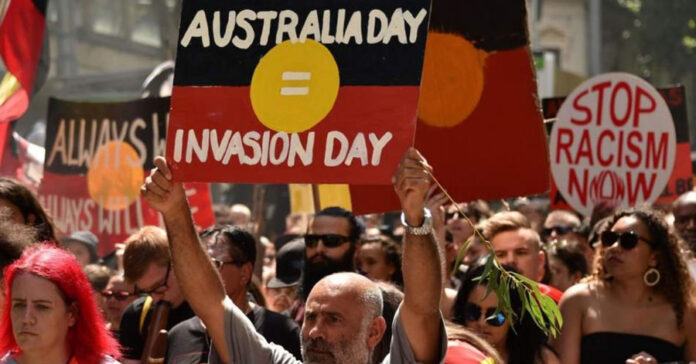Thousands of people took to the streets in cities across the country to protest on January 26 this year. Melbourne alone saw over 10,000 demonstrate against the continued marginalisation of Indigenous people and the dispossession of their land and culture.
One of the prominent demands that has been raised in recent times, and now echoes through discussions in the mainstream media, is to “change the date” of Australia Day.
For Aboriginal people January 26 marks 229 years since the beginning of a violent genocide carried out against the first inhabitants of Australia by the British Empire. Indigenous people were driven off their territory, enslaved and subjected to wholesale slaughter. This genocide is the basis on which Australian capitalism was built. The huge private profits of the wool and agriculture industries, and of mining billionaires today, were made off stolen land.
“Australia Day” was deliberately constructed as part of a nationalist myth that served a dual purpose: to whitewash the atrocities that came with colonisation, and to mask the class divide between working people and capitalists, which is at the core of modern Australian society.
While these were the aims of the establishment, most ordinary people see the January 26 public holiday as a day of recreation, a time to catch up with friends and family, and a day to celebrate the “Australian way of life”. What people generally mean by this is the relatively high standard of living and the vibrant multicultural society we enjoy.
These things however were not brought to us by the British colonisers. All the best things about the “Australian way of life” were won by the labour movement in defiance of the establishment.
Australia has a rich history of working class struggle that has succeeded in wringing out reluctant concessions from bosses and the capitalist state. For example, in 1856 Victorian workers were the first in the world to achieve the eight-hour day after a militant campaign by building workers.
Penalty rates, public holidays, social services, decent pay and safe working conditions were all fought for. Many of these reforms are now under threat from both Liberal and Labor governments operating in the interests of big business. So, far from celebrating together with these people we should be highlighting the class divide which is a real threat to our living conditions.
Historically May Day, or International Workers’ Day, was used as a day to commemorate the battles and victories of the workers’ movement. May Day is not a public holiday in most states in Australia, but it should be. This should be the time when we genuinely celebrate our “way of life”.
Socialists have long called for May Day to be a national public holiday. The trade union movement should fight for this, but ensure that January 26 also remains a public holiday. Instead of changing the date, January 26 should be recognised as ‘Invasion Day’ and used as an opportunity to mark Indigenous struggles and as a day of mourning.
The brutal history of British colonialism and the brave resistance put up by Aboriginal people should not be forgotten or glossed over.
Since colonisation, Indigenous people have suffered through the Frontier Wars, Stolen Generations, the Northern Territory Intervention and two centuries of racist propaganda aimed at justifying the gaping inequalities that exist.
There have never been more than token efforts to right the wrongs of this historic injustice. It has left a very deep impression.
Even today, on average Indigenous people are five times more likely to be unemployed, have shorter life expectancies, and have vastly less access to social services than the non-indigenous population. Since 1991, over 340 Aboriginal people have died in police custody.
Systemic poverty, racism and police violence are an inescapable product of Australia’s capitalist system. While we should fight for reforms, these issues cannot be resolved without restructuring the economy in a way that puts people’s needs before the endless drive for profit.
This would require taking the largest companies into public ownership, sharing out society’s wealth and resources, and creating jobs, infrastructure and social programs for all. This could begin to heal the horrific wounds of colonial capitalism.
Socialists fight for a shared future in which the darkness and oppression of class society is overcome by the bonds of solidarity. All working, exploited and marginalised Australians should join us in this fight.



